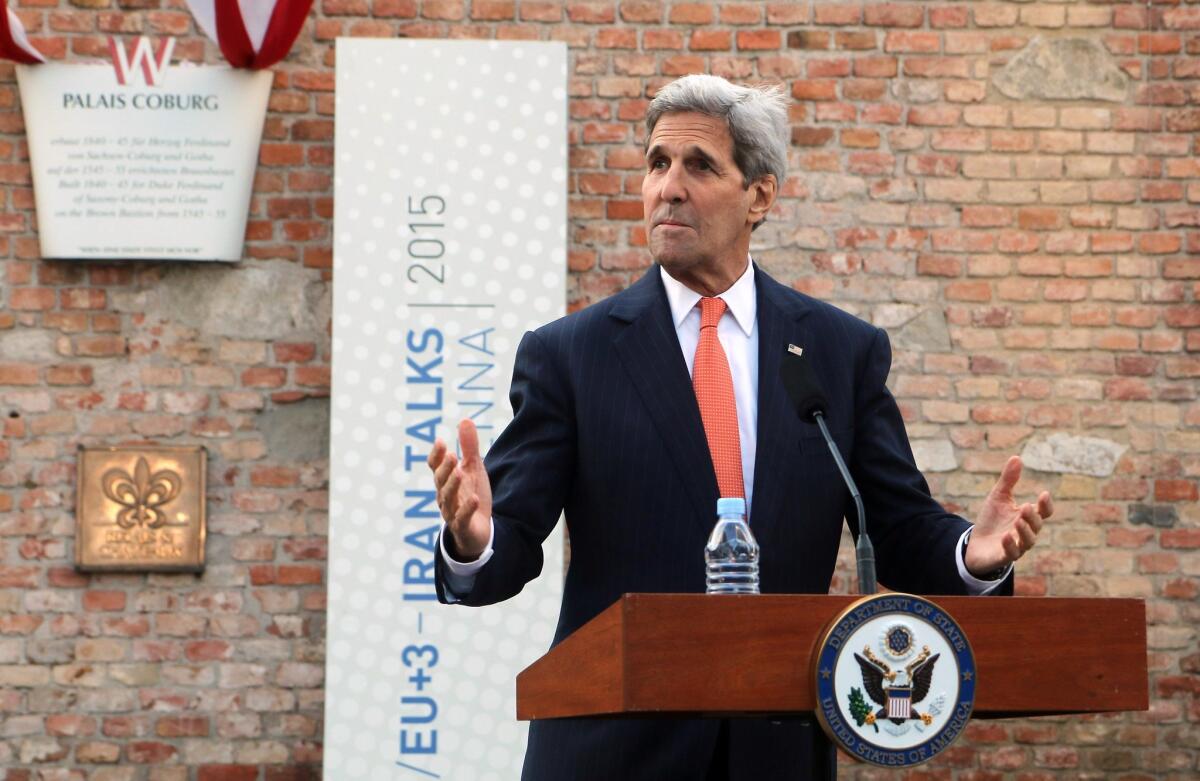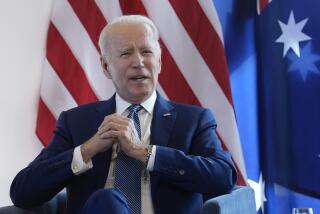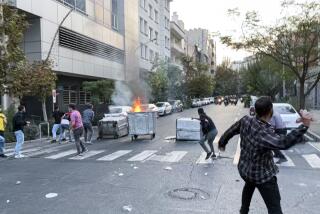Iran says world powers are divided and backtracking in nuclear talks

Secretary of State John Kerry tells reporters Thursday that talks with Iran will “not be rushed.” He spoke outside the Palais Coburg where talks between Iran, the U.S. and five other world powers continue.
- Share via
Reporting from Vienna — As intense negotiations over Iran’s disputed nuclear program appeared to suddenly bog down, a senior Iranian official charged Thursday that the six powers seeking a deal are backtracking on commitments and bickering among themselves.
The official spoke after Secretary of State John F. Kerry damped hopes for a quick conclusion of the talks, publicly acknowledging that contentious issues remained and negotiators weren’t going to meet a congressional deadline of midnight Thursday in Washington.
“We should not get up and leave simply because the clock strikes midnight,” Kerry told reporters outside the hotel in the Austrian capital, where talks have been taking place. “We will not rush, and we will not be rushed.”
Although he said negotiators had made “real progress toward a comprehensive deal,” he also warned that “we are absolutely prepared to call an end to this process” if it appears to be fruitless.
“We are not going to sit at the negotiating table forever,” he said.
Negotiators for Iran and six world powers — the United States, Britain, France, Germany, Russia and China — have been laboring all week to complete the complex deal, and the dueling statements to reporters suggested fresh friction.
The negotiators are seeking an accord that will ease economic sanctions on Iran if it accepts restrictions aimed at preventing it from obtaining a nuclear bomb within 10 to 15 years.
The Iranian official, who declined to be identified in discussing the closed-door talks, said the six countries have sought to renegotiate parts of the preliminary agreement announced April 2 in Lausanne, Switzerland.
He said the disagreements came to a head this week, as the Iranian negotiators have struggled to come to terms with conflicting demands from the six.
“There have been changes of position, and multiple positions,” he said. Iran was being forced to try to make a series of bilateral deals, rather than trying to negotiate with a group that had a common position, he said.
The charges of internal bickering touch on a sensitive subject with the six major powers. They can bring diplomatic pressure to bear in part because they speak with a single voice. Officials always insist that the group is strongly united.
The official declined to identify which subjects the group was arguing over, except to say that it was “a whole range of issues.”
The six countries are known to disagree on whether to end United Nations bans on sales of conventional arms and missiles to Iran.
Russia and China, which are in interested selling weapons to Iran, favor lifting the embargoes, while the United States and European countries are resisting, fearing it would uncork a flood of arms to the volatile Middle East.
The official also said that as part of the final deal, Iran needed assurances that the six countries meet their commitments to fully terminate sanctions. The United States plans to temporarily suspend sanctions as part of the deal and not completely revoke them for years.
Many outside analysts believe the two sides are still likely to reach an agreement in the next few days. But each side is maneuvering for last-minute advantage in hopes of nailing down the best possible terms.
Each side also seeks to convince the public that the other side is hindering a possible agreement. If the deal breaks down, Iran and the six powers will argue about who was responsible and whether tough sanctions on Iran should be restored.
More to Read
Sign up for Essential California
The most important California stories and recommendations in your inbox every morning.
You may occasionally receive promotional content from the Los Angeles Times.











